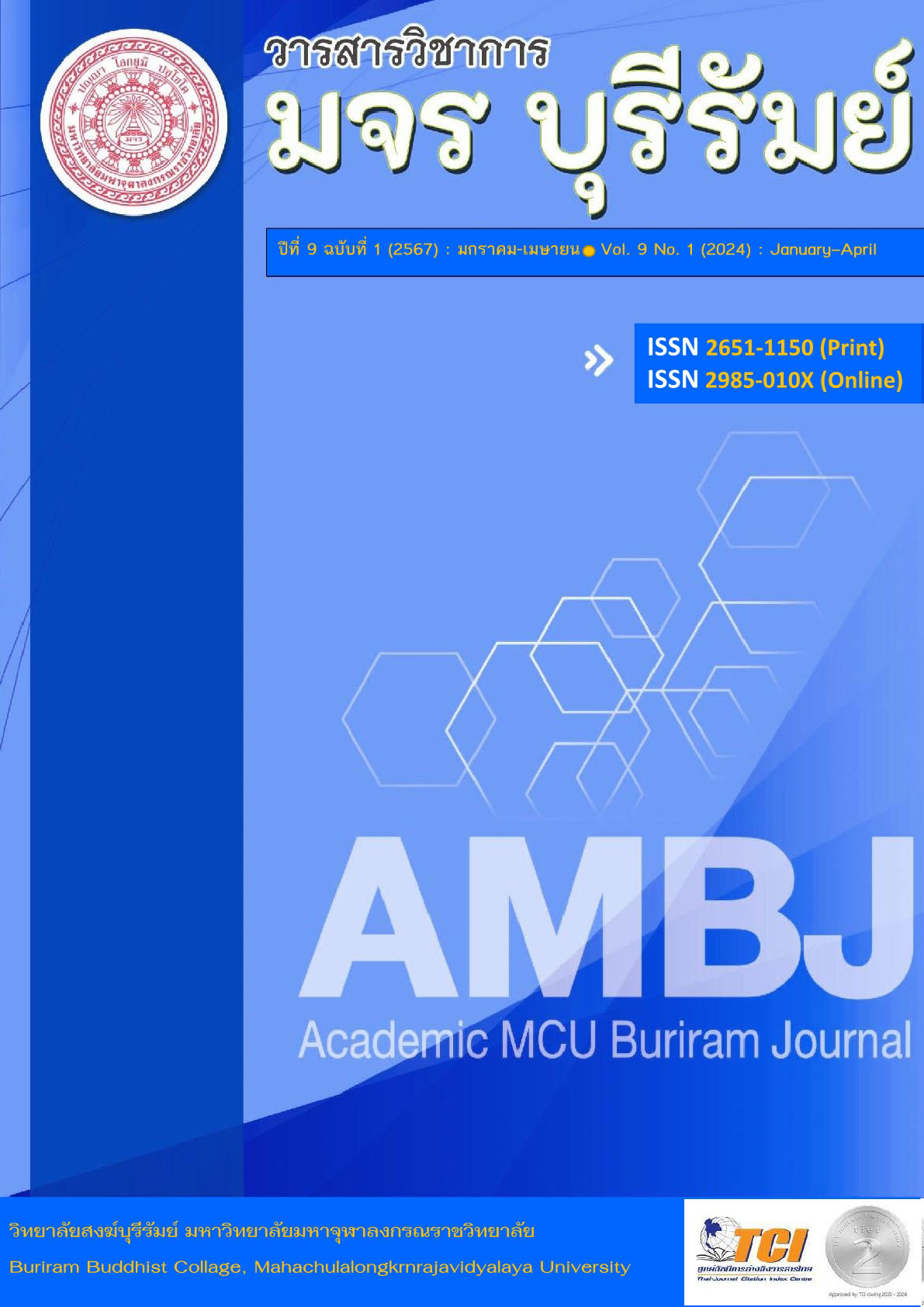Compare the Teachers Coaching Behavior of School Administrators Under Secondary Education Service Area Office Nongkhai
Keywords:
Coaching, Teachers Coaching, Teachers Coaching Behavior of School Administrators, The Secondary Educational Service Area Office NongkhaiAbstract
The purposes of this research were: 1) to compare the teachers coaching behavior of school administrators under secondary education service area office Nongkhai categorized by gender, age, educational status, and school size. The sample group used in this study consists of 19 administrators and 178 teachers within a school under the jurisdiction of the Educational Service Area Office of Secondary Education in Nong Khai. The data on government officials, administrators, and teachers in the school are derived from the annual performance report for the fiscal year 2021. In total, there are 197 individuals, comprising 89 males and 108 females. Among them, 66 individuals are aged between 20 and 30, 81 are aged between 31 and 40, and 50 are aged 41 and above. There are 112 individuals without academic rank, 63 with a proficient academic rank, and 22 with a higher than proficient academic rank. The school sizes are distributed as follows: 97 individuals in small schools, 44 in medium-sized schools, and 56 in large special schools. The research instrument were a questionnaire on the current situation and a questionnaire on the teachers coaching behavior of school administrators. The statistics for data are analyzed by average and standard deviation and comparing the teachers coaching behavior of school administrators was conducted using the F-test Independent and t-test in research terminology.
The research result found that:
The results of the comparison on the teachers coaching behavior of school administrators under secondary education service area office Nongkhai are as follows:
1) The results of the comparison of the teachers coaching behavior of school administrators under secondary education service area office Nongkhai categorized by gender show no significant differences across all five dimensions.
2) The results of the comparison of the teachers coaching behavior of school administrators under secondary education service area office Nongkhai categorized by age show no significant differences across all five dimensions.
3) The results of the comparison of the teachers coaching behavior of school administrators under secondary education service area office Nongkhai categorized by academic credentials show no significant differences across all five dimensions.
4) The results of the comparison of the teachers coaching behavior of school administrators under secondary education service area office Nongkhai categorized by size of school show no significant differences across all five dimensions.
References
เกรียงศักดิ์ นิรัติพัฒนะศัย และคณะ. (2556). เอกสารประกอบการสอน Executive Coaching การโค้ชผู้บริหาร. เข้าถึงได้จาก http://thecoach.in.th/wpcontent/uploads/2013/05/Executive-Coaching-การโค้ชผู้บริหาร-E-Book-โดย ทีม-ECS.pdf (สืบค้นเมื่อ 2 ตุลาคม 2564).
จิรโรจน์ ติกกะวี. (2559). Feedback อย่างไรให้การโค้ชประสบความสำเร็จ. เข้าถึงได้จาก https://www.bankokbiznews.com2prnews/biz2u/209035 (สืบค้นเมื่อ 5 ตุลาคม 2564).
มารุต พัฒผล. (2558). รูปแบบการพัฒนาครูประถมศึกษาด้านการโค้ชเพื่อการรู้คิด. Veridian E-Journal, 8(2), 593-612
วัชรา เล่าเรียนดี. (2556). ศาสตร์การนิเทศการสอนและการโค้ชการพัฒนาวิชาชีพ: ทฤษฎีกลยุทธ์สู่การปฏิบัติ. พิมพ์ครั้งที่ 12. นครปฐม: โรงพิมพ์มหาวิทยาลัยศิลปากร.
วิมุติ หยกพรายพันธ์. (2563). พฤติกรรมคุณธรรมของผู้บริหารโรงเรียนมัธยมศึกษา สังกัดกรมสามัญศึกษา เขตการศึกษา 5. วิทยานิพนธ์ครุศาสตรมหาบัณฑิต สาขาวิชาการบริหารการศึกษา. บัณฑิตวิทยาลัย: มหาวิทยาลัยราชภัฏนครปฐม.
สมาพร มณีอ่อน. (2560). การพัฒนาครูในศตวรรษที่ 21 โดยใช้เทคนิคการโค้ช (Coaching). วารสารศึกษาศาสตร์ มหาวิทยาลัยศิลปากร, 15(2), 61.
สุปราณี ขวัญบุญจันทร์. (2541). จิตวิทยาการกีฬา. กรุงเทพมหานคร: ไทยวัฒนาพานิช.
อัจฉรา จุ้ยเจริญ. (2559). คู่มือการโค้ช เพื่อผู้นำยุคใหม่ = Leader as coach. กรุงเทพมหานคร: แอคคอมแอนด์อิมเมจ อินเตอร์เนชั่นแนล.
Barkley, S.G., & Bainco, T. (2010). Quality Teaching in a Culture of Coaching. 2nd ed. Plymouth: Rowman & Littlefield Publishers.
Bloom, G., Castagna, C., & Warren, B. (2003). More than mentors: Principal coaching. Leadership-Burlingame, 32(5), 20-23.
Cushman, C. S. (2013). The effects of instructional coaching on collective teacher efficacy and school-level teacher effect in Tennessee public middle schools. Doctoral dissertation. Ed.D., Union University, Jackson, 24(1), 32-33.
Harper, Jamie. (2015). Teacher’ Perceptions on the Effectiveness of Instructional Coaching.Masters of Arts in Education. Curriculum and Instruction school of Education, California State University at Stanislaus, 27(2), 26-27.
Knowles, P.J., & Handy, N.C. (1984). A determinant based full configuration Interaction program. Computer physics communication Chemical physics letters.
Lofthouse, R., Leat, D.; & Towler, C. (2010). Coaching for teaching and learning: a practical guide for schools. Newcastle: National College.
Porter, L. (2014). EBOOK: Behaviour in Schools: Theory and practice for teachers. McGraw-Hill Education, 14(1), 80-81.
Valerio, A. M., & Lee R. J. (2005). Executive coaching: a guide for the HR professional. San Francisco: John Wiley & Sons.
Henderson, A. (2018). Coaching for education. Retrieved from http://www.prachachat.net/education/news-157914 (Accessed 10 January 2021).
Downloads
Published
How to Cite
Issue
Section
License
Copyright (c) 2024 Academic MCU Buriram Journal

This work is licensed under a Creative Commons Attribution-NonCommercial-NoDerivatives 4.0 International License.
ทัศนะและความคิดเห็นที่ปรากฏในบทความวารสารฉบับนี้ถือเป็นความรับผิดชอบของผู้เขียนบทความนั้น ไม่ถือเป็นทัศนะและความรับผิดชอบของบรรณาธิการ





